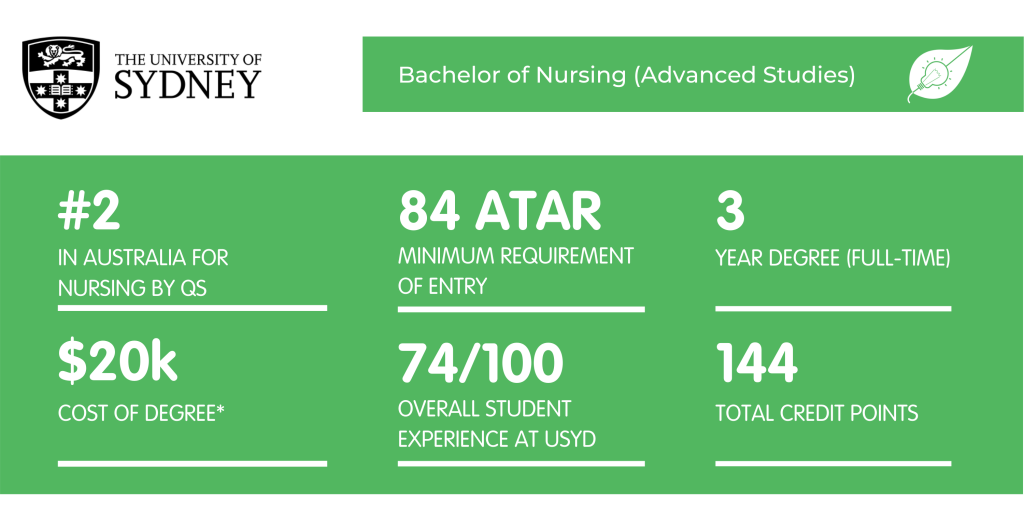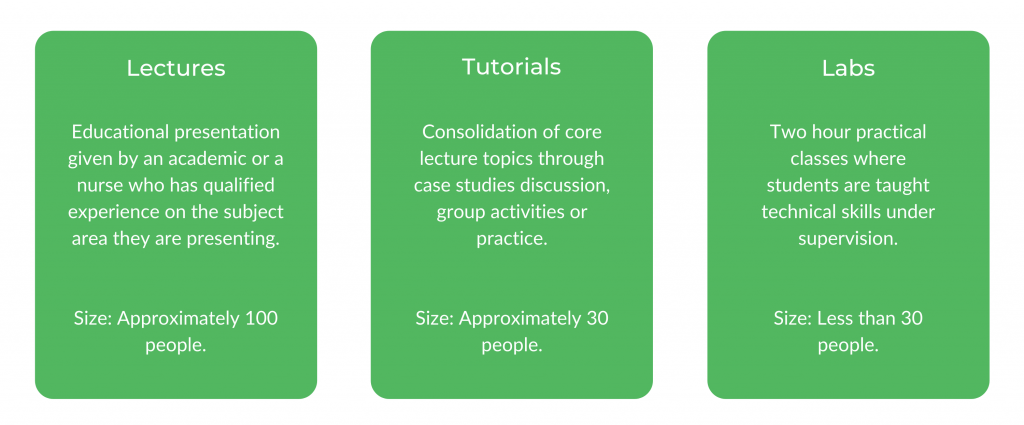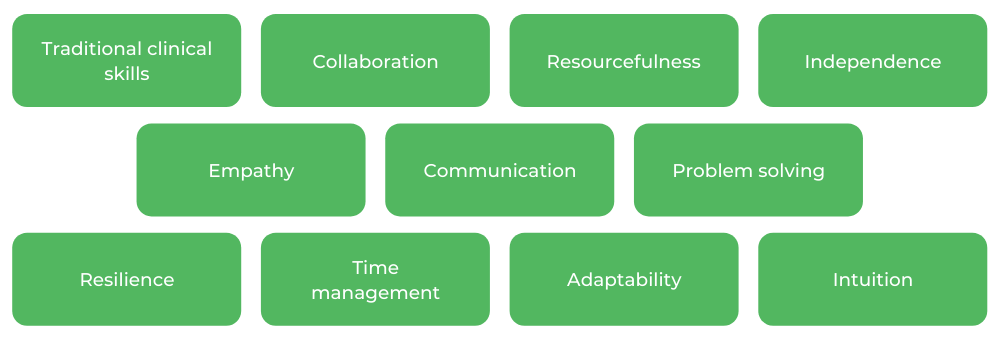
Looking to study a Bachelor of Nursing (Advanced Studies) at USYD?
Here is a run through of what this degree involves, including its classes, assessments, people and more.
Let’s get started!
What is a Bachelor of Nursing (Advanced Studies) at USYD?
Core Units for this Degree
How to Get into a Bachelor of Nursing (Advanced Studies) at USYD
What’s the Teaching Format?
What’s the Faculty and Culture Like?
What is a Bachelor of Nursing (Advanced Studies) at USYD?
A Bachelor of Nursing (Advanced Studies) at USYD equips you with both technical and non-technical skills to help you become a credible candidate for the Nursing and Midwifery Board of Australia.
But what makes this degree unique isn’t its comprehensive practical classes and placements — it’s the “Advanced Studies” counterpart that will refine your non-technical skills such as leadership, communication and empathy while fostering a deeper understanding of the global landscape of healthcare.
This degree is perfect for anyone who loves to help people, and has a knack for problem solving and hands-on work. If you’ve done Biology, Chemistry or PDHPE in high school, you’ll find this degree very interesting as it delves into health and medicine with a specific focus on nursing and its practical application.

Other Degree Options
As the Bachelor of Nursing (Advanced Studies) is solely focused on nursing subjects, unfortunately you don’t get a lot of flexibility in choosing majors and minors as they’ve already been determined for you by course coordinators.
If you’re looking to explore other disciplines of study, you can always do a combined degree such as the:
- Bachelor of Science/Masters of Nursing: Includes laboratory work, science research
- Bachelor of Science (Health)/Masters of Nursing: Includes health research, policy and strategy evaluation
- Bachelor of Arts/Masters of Nursing: Includes humanities, literature and social studies
A combined degree essentially means that you will be doing your Bachelor’s (3 years) and Master’s (2 years) at the same time. This means that your degree will look like this:
| Year of Study | Degree Structure |
|---|---|
| First Year | - Bachelors only |
| Second year | - Bachelors second year - Masters first year |
| Third Year | - Bachelors third year - Masters second year |
To be able to do your Master’s in the last two years of your Bachelor’s, you will need to maintain a Weighted Average Mark (WAM) of 65, a credit average mark.
Although it might seem like a lot of work, this option could be highly rewarding for you if you’d like to be more flexible with your degree, as it encompasses multidisciplinary knowledge and skills that can enrich your qualities as a nurse!
NOTE: Entry requirements to these degree alternatives may differ to the Bachelor of Nursing (Advanced Studies) degree.
You can find more information about the combined degrees through these links:
- Bachelor of Science/Masters of Nursing
- Bachelor of Science (Health)/Masters of Nursing
- Bachelor of Arts/Masters of Nursing
If you’re looking to do further studies, you can also apply for the honours program. Details can be found here!
You can also learn more about USYD’s Bachelor of Science here!
Career Prospects
A Bachelor of Nursing (Advanced Studies) at USYD opens many career opportunities for you as it shapes you to become a flexible, adaptable and resourceful teammate that meets the dynamic needs of the health landscape.
As you specialise in areas such as:
- Agecare
- Paediatrics
- Mental health
- Palliative care
- Community health
- Intensive Unit Care
- Emergency practice
…and many more in your final year, your career options are endless. If you’re looking to specialise further, you can always pursue postgraduate studies in areas such as haematology, mental health and clinical trials practice.
Post-graduate degree information at USYD can be found here!
Besides that, this degree can actually extend your career options beyond the walls of typical clinical and hospital work.
An interesting example is a legal nurse who represents their patient at court. If this isn’t your thing, don’t worry as there are many other niche jobs available for nurses that are increasing due to the ever changing needs of healthcare.
Learn more about what it’s like being a Registered Nurse here!
Core Units for this Degree
The core units for the Bachelor of Nursing (Advanced Studies) at USYD have already been chosen for you, unlike its combined degree alternatives.
The units aim to cover four main areas of nursing to encompass a holistic understanding. These topics include:
| Area | Description |
|---|---|
| Underpinnings to Nursing Practice | More human science and research based |
| Health, Development and Assessment | Basics of health assessment, understanding illness and study of child, adolescent, elderly care |
| Contexts of Practice | Person-centred healthcare concepts |
| Nursing Practice | Clinical nursing knowledge and practice |
First Year
In first year, your subjects tend to be an introduction to the biomedical, social and environmental factors of health. Subjects range from science-related ones such as NURS1001 Health and Human Biology, NURS1005 Interruptions to Normal Physiology to health research and policy in NURS1007 Health Research and NURS1004 Nursing Knowledge, Practice and Policy.
Second Year
In second year, you get to delve into the different areas of nursing such as mental health, agecare, pharmacology, indigenous health care and chronic healthcare.
You will also need to complete a subject on cultural competence to improve your empathy and understanding of the social factors of health. Ultimately, you will gain a holistic understanding of the global picture of healthcare.
Third Year
Third year subjects tend to be more practical based with more placements and professional practice workshops to mould you into a competent nurse. You will also explore other areas of nursing that weren’t included in second year such as critical care, paediatrics, emergency practice and community health.
You can find more information on core units here!
How are placements structured?
The more you progress into this degree, the more placements you get – altogether, you would have completed 900 hours of placement work by the end of the degree. The approximate hours of placement will look something like:
- First year: 180 hours (Health assessment, patient-centred care, acute care)
- Second year: 280 hours (Agecare, Mental Health, Chronic conditions)
- Third year: 360 hours (Paediatrics, Critical care, Community health, Professional practice)
Unlike other courses, USYD provides you with clinical placements in the first year, giving you the chance to decide whether nursing in real life is something you want to do!
These placements are fairly easy to apply as they are already embedded in the curriculum – all you have to do is complete clinical placement checks and clearances before applying for your placement of interest. It doesn’t take long until your unit coordinator emails you on the details of your upcoming placements.
Info about clinical placement checks and clearances can be found here!
What do placements involve?
Placements often take place during the holidays between the semesters so it may seem like you don’t really get a break from nursing.
But these placements do vary between 6 to 8 weeks so if you’re lucky, you might get a two week break before your semester starts! Sometimes, you might need to do your placements during uni semesters.
During clinical placements, you will learn all kinds of technical skills such as how to use a pulse oximeter, setting up intravenous therapy and medication administration under the supervision of the NSW Department of Health. You will learn how to work under pressure, communicate with your teammates and appropriately empathise with your patients.
What sets USYD’s nursing practicals apart is the emphasis on traditional nursing methods such as wound care, CPR and the like – preparing you for emergency situations where appropriate equipment may not be readily available.
Where can I get an internship with this degree?
It can be a bit hard to find internship opportunities at Sydney Uni but the Nursing Faculty does a good job of encouraging students to get started with Gradstart.
Gradstart is a NSW health government program that is exclusively available for nursing and midwifery students in all universities across NSW to help undergraduates transition from university to a full time job. Those who successfully enter the program will experience one year of full time work and two rotations in different wards.
For more information on Gradstart, click here!
How to Get into a Bachelor of Nursing (Advanced Studies) and USYD
An ATAR of 84 will guarantee you a spot for USYD’s Bachelor of Nursing (Advanced Studies) degree! Don’t sweat too much if you didn’t get the ATAR though, as there are alternative pathways to this degree which you can find here.
What scholarships are available?
In the Sydney Nursing School, there are 5 scholarships available for nursing students to support them in different circumstances. These include the:
- Susan Wakil Scholarship – Undergraduate Indigenous
- Susan Wakil Scholarship – Undergraduate Greater Sydney
- Susan Wakil Scholarship – Undergraduate Rural and Regional
- Walter and Eliza Hall Scholarship Trust Opportunity Scholarship for Nursing
- Women’s Plans Foundation Award
For more information about scholarships within the Faculty of Medicine and Health, you can read more here!
What’s the Teaching Format?
Besides its extensive placements, the Bachelor of Nursing (Advanced Studies) at USYD consists of lectures, tutorials and practical labs. These classes run in semesters that typically last 17 weeks including mid-sem break, STUVAC and final exam period, with two semesters per year.

The two hour lectures often cover content that is related to your subject, exploring relevant concepts, practices and experiences in nursing within a class of approximately 100 students.
In tutorials, you will work with tutors to learn new concepts or consolidate lecture content through revision while solving case studies and putting theory into practice. A typical tute will have around 30 people.
Labs are more hands-on as you will learn practical skills such as CPR, blood pressure assessment, intravenous fluid (IV) bag set ups or regular clinical assessments.
Sometimes, you will be given a scenario to work out the most appropriate response, refining your adaptive, resourceful and quick thinking under pressure. These labs are usually 2 hours long and have less than 30 people per session.
How many hours do you have to spend at university?
Nursing students often have a moderate amount of contact hours as their two hour tutorials and labs are not too long and tend to alternate between weeks. Altogether, it would sum up to 20 contact hours per week if you’re planning to do full-time study.
If you plan your timetable out carefully, you would only need to set foot on campus 3 days a week!
But this doesn’t count the fact that nursing students may have to do their placements during uni semesters. Sometimes these placements can take up the daytime, meaning that students have to grind on university work at night!
What are the assessments like?
Assessments in nursing are highly diverse, including reports, essays, quizzes, finals exams and a lot of group work. How many of these assessments you get in a semester can vary with each subject you take.
Reports and Essays
Reports and essays are the main assessments you get in your nursing degree. Some of these reports and essays will be based on case scenarios, where you will need to assess the given symptoms and scenario to design a suitable treatment based on literature and evidence-based research.
These reports and essays are usually 1000 to 3000 words long and its weightage depends on the unit coordinator. Depending on your units, you may need to write these reports as a group.
Other Assessments
Other group work includes presentations on broader topics that require multiple insights to find a solution. These presentation times and weighing will vary according to subject.
Quizzes are peppered throughout the semester to consolidate your understanding of the concepts and its practical application to a number of scenarios. Its weightage will vary according to the unit.
As you progress each year into your nursing degree, you get less final examinations. These final examinations often have less multiple choice questions and more short/long answer responses that tests your understanding over memory.
These final exams can weigh between 35% to 50% depending on the subject.
What are the key skills you develop?

The diverse set of skills fostered by this nursing degree will shape you into a highly adaptable nurse that many healthcare employers are looking for in an ever-evolving world.
USYD takes a step further to ensure their nursing students understand the concept behind why they do things, so they can apply it to real-life scenarios and independently find solutions without relying on technology to any situation that life throws in their way — making this one of the most rewarding and valuable degrees.
Ultimately, this degree at USYD sets itself apart through its refined and particular training, teaching its students to perfect the small things to achieve the bigger picture.
What’s the Faculty and Culture Like?
As almost all of the Nursing classes are situated in the new Susan Wakil School of Nursing building, it is a fairly tight-knit community filled with warm, friendly and supportive people. The faculty staff are also very supportive, passionate and willing to help you to do your best!
Culture
Overall, nursing students are about the friendliest people you will ever meet! It is fairly easy to make friends with nursing students as they always have each other’s back and its many group tasks normally require you to interact and communicate with your classmates.
Unlike other degrees, the mandatory units in this degree makes it easy to maintain these relationships as you will see the same people in your classes for these three years.
On top of that, Sydney University also has high quality lecturers and tutors who are happy to help their students. Notable lecturers, such as Tim Wand engage his students with his passionate lectures that will change your perception of mental illness.
The staff also care a lot for their students too, as they are always willing to break down concepts so you can understand them easier.
Sydney University Nursing Society
Luckily for you, there is a society made for nursing students called the Sydney University Nursing Society (SUNS) that acts as a bridge between the Nursing degree course coordinators and its students!
Essentially, they provide information about what is happening in their faculty and courses, with news and updates relating to your nursing degree. Being part of this society will be beneficial to your studies with all the useful updates they provided, and it comes highly recommended by both Bachelors and Masters of Nursing students alike.
Want to know more about what it’s actually like studying Nursing at USYD? Check out our article here!
Wondering where else you can study Nursing?
Picking where to study requires a lot of research and time to ensure that you’re making the right choice! Check out where else you can study a Bachelor of Nursing:
NSW
Victoria
Queensland
Curious about the top universities for a Bachelor of Nursing? Check out the top 5 here!
Kate Lynn Law graduated in 2017 with an all rounders HSC award and an ATAR of 97.65. Passionate about mentoring, she enjoys working with high school students to improve their academic, work and life skills in preparation for the HSC and what comes next. An avid blogger, Kate had administered a creative writing page for over 2000 people since 2013, writing to an international audience since her early teenage years.


